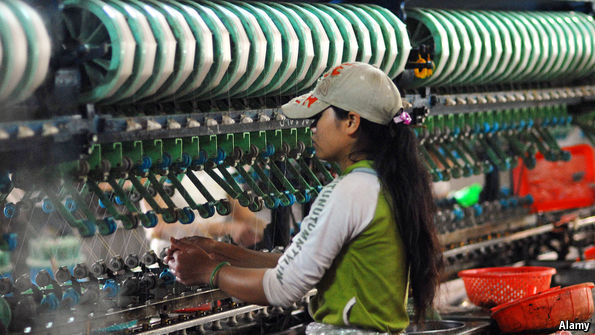
WHEN she was sent to prison for helping organise a strike at a shoe factory in Vietnam’s Mekong-delta region, Do Thi Minh Hanh was only 25. In the four years that followed the young labour activist was shuffled through six different jails, enduring beatings from guards and other inmates. Released in 2014, Ms Hanh carries on with her campaigning. But she says that police stationed near her house often prevent her from travelling to meet workers. Women, their identities hidden by face masks, are sometimes enlisted to manhandle her back into her home.
Ms Hanh is one of many outcasts hoping that Barack Obama’s three-day visit to Vietnam, which begins on May 23rd, will bring a little succour. Mr Obama is the third American president to visit the country since the Vietnam war, and the tour will further deepen ties that have improved during his two terms—some analysts even think that the White House may ease an arms embargo. Mr Obama’s visit is a chance to celebrate the signing of the Trans-Pacific Partnership (TPP), an American-led free-trade pact agreed upon late last year that Vietnam is expected to ratify soon. As a condition of entry, the ruling Communist Party of Vietnam has made some surprising commitments, including to tolerate the kind of independent labour-organising that has made Ms Hanh a pariah. But that is a promise on paper only.
No nation stands to gain more from the TPP than Vietnam, which, the World Bank guesses, will get a GDP boost of 10% by 2030. Lower foreign tariffs would increase exports such as garments and shoes. The deal would also spur local production of fabric and much else that is currently imported. The TPP is popular with ordinary Vietnamese. They like any effort that reduces their dependence on China, Vietnam’s big northern neighbour, with which it has a big trade deficit and a bitter territorial dispute. Meanwhile, reformers in government hope that TPP membership will hasten the privatisation of bloated state-owned enterprises, which have long weighed on the economy but which vested interests make difficult to slim.
A giant step for a paranoid party
More sensitive is the obligation to liberalise Vietnam’s labour laws. A side agreement signed with America—and designed to satisfy critics in the American Congress—requires Vietnam to pass a law allowing workers to form independent trade unions at the factory level by the time the TPP comes into force; and after five years these unions must be allowed to form national and industrial federations. Some of the valuable tariff exemptions on offer to Vietnam will be held back until after this five-year target has been met.
The stipulations stand to end a monopoly long held by the Vietnam General Confederation of Labour, a fusty arm of the party under which all unions are presently herded. Its affiliates and its 8,000 full-time staff transmit the party line and organise morale-raising shindigs. It is common to find union leaders holding down jobs in company personnel departments. But the confederation has become less effective at averting strikes, which have grown to 4,000 in the past ten years, a fourfold increase on the previous decade.
Tolerating independent unions would be a big step for a paranoid one-party state in which churches and chess clubs receive formal supervision. There are few signs that the state is ready to make the leap. In the past few weeks police have carted away activists protesting against pollution that appears to have caused tonnes of dead fish to wash up on beaches in north-central Vietnam. The authorities claim that the demonstrations have been instigated by “terrorists” abroad.
The indications are that the party will find ways to neuter its pledge on unions, for fear of midwifing movements which may one day threaten its control. Activists warn that an official summary of Vietnam’s labour agreement with America omits details such as the right of independent unions to collect fees from employers, as the state’s labour federation does. The summary also hints that authorities will continue to hobble groups deemed to endanger “societal orderliness”.
A partial implementation of the agreement may yet be better than nothing. A debate about labour laws might at least help reformers fashion the state-run union into a more effective body, thinks Erwin Schweisshelm of the Friedrich Ebert Foundation, a German think-tank. But much relies on America’s convincing the government that it is prepared to withhold Vietnam’s tariff exemptions should progress be deemed insufficient. The deal’s critics in the West claim that America has done a bad job of enforcing labour-rights clauses in previous free-trade agreements, for example with Peru and Colombia. Supporters counter that the wording of the deal with Vietnam lays out the obligations, and potential sanctions, more explicitly than do previous agreements.
The one certainty is that none of this will be tested if, as is increasingly feared, America’s own lawmakers end up not ratifying the TPP. Activists in Vietnam are not holding their breath. In November, weeks after the terms of the TPP were made public, plain-clothes policemen spirited Ms Hanh away from a meeting with fired factory workers to a police station; she says she was choked and beaten about the head. The government accuses her and others like her of aiming to overthrow it. She says she only wants workers to know their rights.